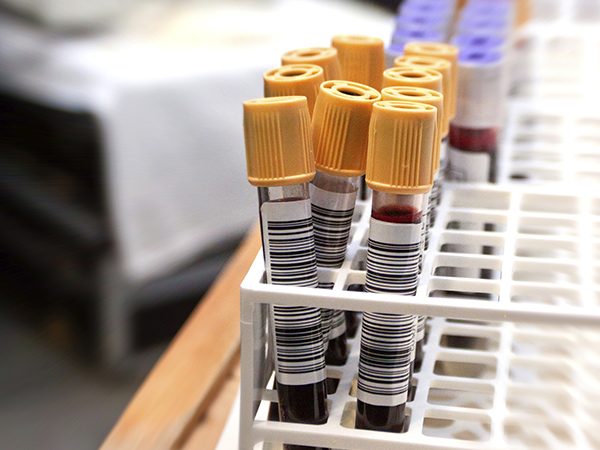Seeking Clues to Early-onset Colorectal Cancer
The 2020 death of actor Chadwick Boseman shocked the public, sparking grief in those who revered his portrayal of the Black Panther. It also raised questions about how a young man who appeared healthy and strong could have died of colorectal cancer.
Research both before and after Boseman’s death shows that he was not an anomaly.
Colorectal cancer is the second most deadly type of cancer, expected to cause 52,580 deaths in the United States this year. Advances in screening and detection have led to sustained declines in incidence and mortality rates in the past few decades. As of 2019, the incidence rate of colorectal cancer was 34.10 cases per 100,000 people, down from a peak of 66.61 in 1985. The mortality rate was 12.82 per 100,000, down from a peak of 28.58 in 1976, according to federal statistics.
The overall improvement belies some challenging realities surrounding colorectal cancer. This cancer type is marked by racial disparities, with Black patients more likely to be diagnosed at advanced stages, when the cancer is more difficult to treat. Meanwhile, early-onset colorectal cancer—defined as a diagnosis before age 50—is on the rise, currently accounting for about 12% of all colorectal cancer cases.

A study published last year in Cancer Epidemiology, Biomarkers & Prevention, a journal of the American Association for Cancer Research (AACR), showed that individuals between 20 and 39 years old experienced the steepest increase in distant-stage early-onset colorectal adenocarcinoma incidence between 2000 and 2016. Other research has led to estimates that by 2030, one in 10 colon cancer cases and one in four rectal cancer cases will occur in those younger than age 50. Mirroring the overall trend, early-onset colorectal cancer is more frequently diagnosed at advanced stages in Black and Hispanic populations.
Understanding the biological underpinnings of early-onset colorectal cancer has been a major focus of Andreana N. Holowatyj, PhD, MS, assistant professor of medicine and cancer biology at the Vanderbilt University Medical Center and Vanderbilt-Ingram Cancer Center. In a study published this month in AACR journal Cancer Discovery, Holowatyj and colleagues explained that while the cause of early-onset colorectal cancer is unknown, multiple factors likely contribute, including diet, social determinants of health, and genetics.
To characterize genetic differences in patients of different racial/ethnic groups and sexes, Holowatyj and colleagues used AACR Project GENIE to assess data from 6,903 patients with colorectal cancer. About 9.5% of the samples were considered “hypermutated” and excluded from further study. Among the nonhypermutated cases, researchers found that patients with early-onset colorectal cancer were more likely to have a low tumor mutational burden than those with late-onset disease. However, among patients with early-onset disease, Black patients were more likely to have high tumor mutational burden than white patients. Differences in mutation frequencies were observed in many genes, including FLT4, FBXW7, RNF43, LRP1B, APC, PIK3CA, and ATRX.
The study also analyzed sex-specific differences. Men tended to have lower tumor mutational burden than women. Women were more likely to have TP53 mutations, while mutation rates varied in other genes, such as EP300, KRAS, AXIN2, WRN, BRAF, and LRP1B. Noting that men with early-onset colorectal cancer are 12 to 18% more likely to die of the disease than women, Holowatyj said further validation and understanding of these genetic differences could help guide decisions about how to treat patients.
“Importantly, the data provide an important step forward in understanding the more complex etiology of early-onset colorectal cancer, which likely occurs through a complex interplay of genetic, environmental, and socioeconomic influences,” wrote the authors of an accompanying commentary.
This study adds to research Holowatyj presented at AACR Annual Meeting 2021, which also drew upon AACR Project GENIE to show that Black patients with early-onset colorectal cancer had significantly higher tumor mutational burden than white patients. Holowatyj discussed her research in an AACR Stories video.
Several other studies published in AACR journals in the past few years have further explored the rise in early-onset colorectal cancer. Editors have provided those articles in a featured collection. The Spring 2023 issue of Cancer Today features an article that examines the unique challenges faced by patients with this cancer type.
How can screening help improve colorectal cancer outcomes?
In 2021, noting the increasing incidence of colorectal cancer in younger Americans, the U.S. Preventive Services Task Force recommended that people with average risk for colorectal cancer should begin getting screened for the disease at age 45, down from the previous recommendation of 50.
In a guest blog post last year, AACR Past President Raymond N. DuBois, MD, PhD, FAACR, explained that that because colorectal cancer often develops from precancerous polyps, screening provides a chance for doctors to detect polyps and remove them before they can become cancerous. He suggested that people consult with their physicians to determine whether colonoscopy, or a stool or blood test, is the best screening tool.
In a press release on the previously mentioned Cancer Epidemiology, Biomarkers & Prevention study, Jordan Karlitz, MD, of Denver Health Medical Center and the University of Colorado School of Medicine, voiced support for the updated USPTSF guidelines. However, he noted that people with a family history of disease or those who are displaying symptoms of colorectal cancer, such as a change in bowel habits, blood in the stool, or unexplained weight loss, may need to advocate for getting screened even earlier than age 45.
Karlitz also emphasized the importance of examining racial differences in colorectal cancer as the cancer research community continues to work toward ending disparities.
“We need to place additional focus on racial subgroups that have an increased tendency to present with distant-stage disease, including the youngest non-Hispanic Black and Hispanic populations,” he said. Additional research to understand risk factors underlying the rise in early-onset colorectal cancer is also necessary, he added.



